You’re finally an adult. Congrats! Perhaps you’ve finished college or trade school, or found another path toward a current or future career. Now, you’re looking to forge your own path through the rest of your life. Some people manage to stay close with friends from their childhoods or teens. But maybe you’ve moved or fallen out of touch with your previous friends, or you never had many friends to begin with, and now you’re wondering: “What now? How do I even begin to make friends?” School was a great place to meet new people – you were forced to sit in classes with the same kids for years, and it’s proven that close proximity often creates many relationships. Either way, it’s easier to make friends as a kid. It’s not as easy as an adult. Now, the people you’re stuck with for hours every day are coworkers, which may or may not prove worthy to be friends. And if you’re working a job that requires you to put in at least 40 hours a week, you likely find that your free time is limited. Whether you’re naturally introverted, or you used to be a social butterfly, it can be tough to branch out and make new friends.
The good news? There’s hope. There are numerous resources out there that tell you how exactly to make friends, and why it’s so important to your development. One of the number one ways to make friends is to take initiative. You can wait around for someone to talk to you, but you may be waiting a long time. If you see someone interesting – maybe they’re wearing a shirt for a band you like, or they have pins for a book you like – reach out and say “hey.”
For an introvert, or those with social handicaps, this can seem like an insurmountable feat. But you don’t need to go all in right away. Just a simple “hello” or a nice compliment can spark a conversation. Other ways to make friends include joining a new club (or clubs, for you extroverts), volunteering at a new place, or taking part in local events. If you choose something you’re passionate about, or even mildly interested in, you’re bound to meet people who feel similarly. Passion is infectious, and being in proximity with the same people on a regular basis can help you feel more comfortable with them. And don’t forget the social basics. Appearing friendly makes it easier to connect with others, and eventually to make friends. A smile can really help people feel more comfortable with you, and when people are comfortable, they are more likely to open up to you.
One important difference between making friends now, as an adult, compared to making friends when you were a child, is that you must be intentional. You may have noticed the trend with the three suggestions given – you have to be the one to take the first step. You may face rejection, which will hurt. You also will need to devote substantial time and energy into building and maintaining relationships. Is it hard? Yes. Is it impossible? Not at all.
You may be asking yourself: “Why me? Why do I have to do all of the initial, hard work?” It makes total sense if you think that way. But let’s put things into perspective. Most people in society are at this invisible impasse – wanting to branch out, to be friendly, but not wanting to put in the energy or face the potential rejection. Someone has to break the impasse, or things won’t move. If you want to make friends (and this video explains why that’s a great goal to have), why not show some initiative? It just might make you more appealing to the pool of potential future friends.
Maybe it’s beyond that, and you’ve convinced yourself that you’re okay being friendless. Odds are, you don’t know just how insidious loneliness is. There is currently an epidemic of loneliness, in your own communities. According to NPR, loneliness has the same life-shortening affects as smoking 15 cigarettes a day. Yup. 15 a day. And the demographic this epidemic affects the most? Young adults. This is due to a multitude of differing causes. Social media is one, yes, but so are the young people, and the effects of the COVID pandemic and its lockdowns. That doesn’t even mention the current state of our economy, the pervasiveness of ‘hustle culture’ or overworking, or the societal emphasis on complete independence.
This sounds bleak, but it’s important to realize just how detrimental loneliness is. When you’re armed with knowledge, it makes it easier to step out of you comfort zones to try to fix the issue. If you take one thing away from this post, let it be this: friendships are important, not only for your mental health, but for your physical health too. And by taking the first step, you may create friendships that will last a lifetime.
https://www.nytimes.com/2022/10/01/well/live/how-to-make-friends-adult.html (may require a subscription to read)
https://parade.com/1204851/kaitlin-vogel/how-to-make-friends/
https://www.youtube.com/watch?v=I9hJ_Rux9y0&t=10s (Why You Are Lonely and How to Make Friends by Kurzgesagt)



